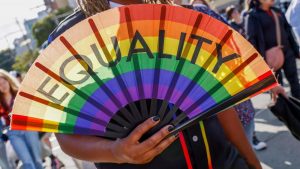
Stephen L. Carter: If Trump wins, liberals might regret this social media ruling
I’m trying to figure out why I’m so deeply troubled by this week’s result in Murthy v. Missouri, where the Supreme Court dismissed a lawsuit that challenged the Biden administration’s “jawboning” of social media companies to remove certain posts about COVID-19 and the 2020 election. In an opinion written by Justice Amy Coney Barrett for a 6-3 majority, the justices determined that the plaintiffs lack standing, a prerequisite for a lawsuit. Maybe they do. Yet I keep coming back to hypotheticals that begin: “Let’s imagine it’s still the McCarthy era” or “Suppose for the sake of argument that Donald Trump wins the presidential election.”
Perhaps the reason I’m troubled is that I deeply, sincerely and passionately believe that the freedom of speech is central to democracy. The government should be forced to keep its fingers far away from the levers of speech regulation for the same reason that a bank shouldn’t hire a convicted embezzler: temptation, temptation, temptation.
The Murthy case arose as a challenge by three individuals and two states to content moderation decisions by social media companies. As private companies plainly have the power to do exactly that, ordinarily an unhappy user could at best sue for breach of contract. (And quickly lose.)
Here, however, the plaintiffs argued that the moderation decisions resulted from pressure by Biden administration officials, giving their case First Amendment implications. It’s a well-established principle that if the government can’t censor, it can’t coerce private actors to censor either.
Whether a government campaign to get social media companies to restrict “misinformation” constitutes unconstitutional coercion is an important question. But the justices kicked the can down the road. As Barrett explained, the plaintiffs were for the most part unable to point to specific harms that they had suffered; and, to the extent that they did claim harms, they had not alleged facts sufficient to show that those harms stemmed from the administration’s actions.
For example, one plaintiff alleged the following sequence of events: The government asked Facebook to take down certain anti-vaccine posts. Facebook emailed back that it had done so. After that, the plaintiff’s anti-vaccine sentiments were removed. Given the timeline, writes the majority, it’s hard to see how that government request could have led to the removal of her posts, specifically.
I share the view that standing is of bedrock importance. But here, with respect, the majority’s analysis seems not quite right. In 1954, Harvard cashiered a professor at the medical school after congressional Red-baiters called for her dismissal after she refused to testify at a hearing about Communism. Later, the university dumped a psychology professor who did the same. Even if the McCarthyites complained only about the first professor, we surely wouldn’t say that there was no connection between the two cases.
This connection matters. The reason governments punish speech is rarely to “get” one particular speaker — it’s to make sure that all the other potential speakers get the message, and learn what not to say. Similarly, the reason governments pressure social media companies is rarely to “get” a particular user — it’s to make sure that all the other users get the message, and learn what not to say.
There are plenty of similar examples, many collected in the trial court’s 155-page opinion granting a preliminary injunction. Quite possibly many of the claims would be disproved at trial. And a trial would be a useful way to find out exactly what occurred. Perhaps the administration’s campaign wasn’t as bad as it might appear. Perhaps it was worse. Alas, no standing means no trial, so we won’t find out.
My concern isn’t to defend false information about COVID-19 or elections or anything else. My concern, rather, is that if we follow the majority’s logic, we might conclude that even if government pressure on tech companies is wrong, few plaintiffs will ever have standing to challenge it. That’s why Justice Samuel Alito’s dissent, if in places a bit over the top, seems correct in its worry that the administration’s campaign might “stand as an attractive model for future officials who want to control what the people say, hear, and think.”
One answer to all this is that it’s important that the public be protected from misinformation about, say, the COVID vaccines. Fair enough. But importance is not enough. To believe in free speech is to refuse to draw the distinction between those we agree with and those we don’t. If it’s really this hard to find standing to challenge the Biden White House’s efforts to persuade social media companies to delete or limit the range of certain posts, it will be just as hard to find standing, if, say, a Donald Trump-run White House does the same.
So I guess now I know why I’m troubled.
Stephen L. Carter is a Bloomberg Opinion columnist, a professor of law at Yale University and author of “Invisible: The Story of the Black Woman Lawyer Who Took Down America’s Most Powerful Mobster.”
Related Articles
Other voices: As America sank into the couch, Joe Biden and Donald Trump combined for a depressing farce. Enough
How should universities teach the Palestinian-Israeli conflict?
Nolan Finley: Biden lost more than the debate to a predictable Trump
Thomas Friedman: Joe Biden is a good man and good president. He must bow out of the race.
Kenneth Seeskin: Are the Ten Commandments the basis of our moral system?


